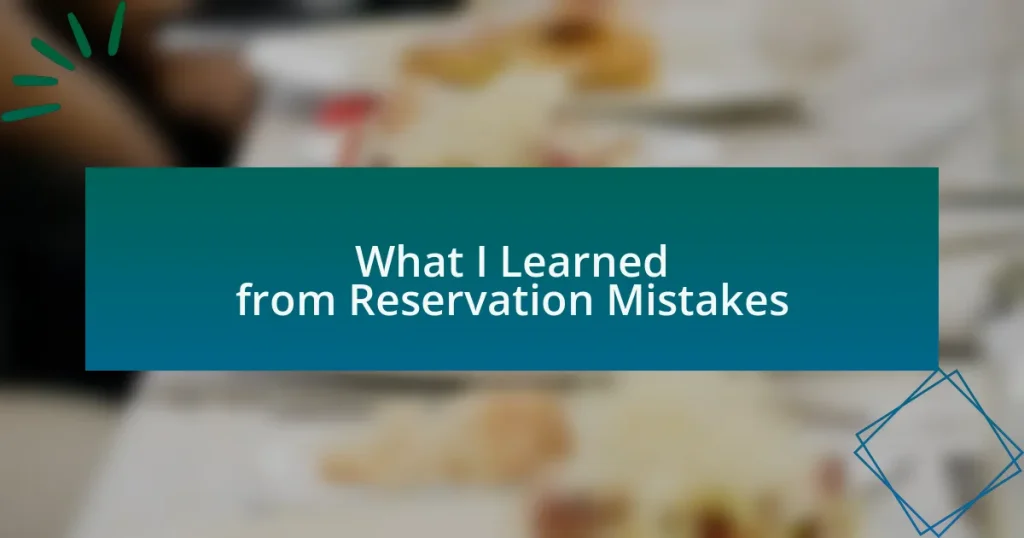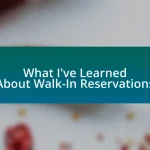Key takeaways:
- Clear communication with restaurants is essential to avoid reservation mistakes and misunderstandings.
- Making reservations in advance enhances the dining experience and ensures access to desired dishes.
- Learning from past mistakes can improve future dining experiences and strengthen connections with restaurant staff.
- Being polite yet assertive in communication can lead to better outcomes and more enjoyable dining adventures.
Author: Evelyn Harrington
Bio: Evelyn Harrington is an acclaimed author known for her evocative storytelling and intricate character development. With a background in literature and creative writing, she has published several best-selling novels that explore themes of resilience and identity. Her work has garnered numerous awards, including the prestigious Waverly Prize for Fiction. When she’s not writing, Evelyn enjoys hiking the scenic trails of her hometown and engaging with her readers through her popular blog. She currently resides in Portland, Oregon, where she continues to craft compelling narratives that resonate with audiences worldwide.
Understanding Reservation Mistakes
Reservation mistakes can be frustrating, but they often stem from simple misunderstandings. I remember one evening when I arrived at the bistro, only to discover that my reservation didn’t go through. It’s a sinking feeling, isn’t it? You have your heart set on a special night, and suddenly it feels like it’s slipping away.
I’ve also learned that timing plays a crucial role. I once booked a table for an early dinner, forgetting that the restaurant might be quieter than usual. When I arrived, they had reserved me a prime spot, which felt awkward as the staff were still setting up. Have you ever walked into a place where the energy just feels off? Those moments highlight the importance of clear communication.
Another aspect I’ve noticed is the inconsistency in how reservations are confirmed. There have been times when an email confirmation didn’t arrive, making me doubt whether I’d booked at all. It raises the question: how often do we take for granted that a reservation is set just because we pressed “confirm”? This experience taught me to always double-check, ensuring that we’re on the same page with the restaurant.
Importance of Reservations in Dining
Reservations play a pivotal role in ensuring that your dining experience is seamless and enjoyable. I’ve noticed that when a restaurant has a solid reservation system, it reflects their commitment to customer service. It’s reassuring to know that a table is waiting for you, especially during busy dinner hours. Have you ever walked into a packed restaurant and felt that wave of anxiety when you realize your name isn’t on the list? That’s why it’s crucial to secure your spot in advance.
I remember a night when I opted for a spontaneous dinner out. With no reservation, our party faced a long wait, and my stomach grumbled with each passing minute. It’s interesting how a simple decision can shift the entire mood of the evening. This experience reinforced my belief that planning ahead can enhance not only your dining experience but also the enjoyment of the entire occasion.
Moreover, making a reservation often indicates that you’re making a commitment to enjoy the restaurant’s offerings. I’ve often found that the best dining spots tend to fill up quickly, and without a reservation, you might miss out on the chance to explore unique dishes or special seasonal menus. When you take the time to reserve, you’re opening the door to culinary adventures that could otherwise slip by unnoticed. Isn’t it worth it to invest a little time in planning for a great meal?
Common Reservation Issues Faced
Reservation mistakes can often lead to frustrating experiences, and I’ve certainly felt the impact of these blunders firsthand. One common issue I’ve encountered is double booking, where the restaurant mistakenly reserves the same table for two different groups. This not only creates confusion but can lead to awkward conversations as the staff tries to manage the situation. Have you ever been caught in a scramble to find an alternate table while others around you enjoy their meals? It’s not ideal.
Another frequent challenge is last-minute cancellations without proper notice. I recall one evening when I excitedly arrived at a bistro, only to find my reservation was marked as cancelled—a situation that left me feeling both disappointed and hungry. The unpredictability of some diners can disrupt the careful planning by the restaurant, making it vital that both parties honor their commitments. Wouldn’t it be great if everyone practiced a bit more consideration when making reservations?
Lastly, I’ve noticed that unclear reservation policies can lead to misunderstandings. For example, I’ve had experiences where the time limit for dining wasn’t communicated upfront, leading to an uncomfortable rush toward the end of my meal. This lack of transparency can dampen a pleasant evening. When I think about all these scenarios, it’s clear that effective communication between diners and restaurants is crucial. What are your thoughts on how reservations should be managed to prevent these issues?
Learning from My Own Mistakes
Learning from my own mistakes has been a journey filled with lessons and self-reflection. I remember one evening when I shifted my reservation to a later time, thinking it wouldn’t be a problem. However, I arrived to find the restaurant packed, and they had given away my table. The disappointment I felt that night taught me to confirm changes right away and consider the potential ripple effects on the restaurant’s operations.
Another memory that sticks with me involves not double-checking my reservation details. On one occasion, I assumed my booking was for a Friday when, in reality, it was for the following Saturday. When I showed up expecting a celebratory dinner, I was met with an apologetic smile and a reminder that I hadn’t followed up on the confirmation email. It struck me then how easily misunderstanding small details could turn a night out into an exercise in patience.
I also learned the hard way that being late can have its consequences. Once, I underestimated traffic and arrived twenty minutes past my reservation time, only to find my table had been reassigned. That feeling of embarrassment and frustration lingers even now. It reminded me of the importance of punctuality; it’s not just about me having a good experience—it impacts everyone involved. How can we expect the restaurant to save our spot when others may be waiting?
Tips for Making Successful Reservations
When making a reservation, I’ve found that clarity is key. Once, I made a booking over the phone and didn’t clarify whether it was for dinner or brunch. When I arrived at the restaurant, I was confused to see a different crowd and menu. Now, I always ask for specifics, just to avoid any surprises. Don’t you agree that it’s better to feel confident about what you’re walking into?
Another tip I swear by is to always plan ahead. I remember trying to secure a last-minute reservation for a popular place on a weekend. Unfortunately, my chances were slim, and I ended up at a less-desirable location. Since then, I’ve learned the value of booking well in advance, especially if it’s a special occasion. Have you ever faced the disappointment of missing out on a sought-after dining experience?
Finally, don’t hesitate to reach out to the restaurant directly if you have special requests or dietary needs. I recall an instance where I didn’t mention my allergy to shellfish when booking. Luckily, they were accommodating, but I couldn’t help but feel a bit anxious throughout the meal. Now, I make it a point to communicate my requirements upfront. After all, who wants a meal to be overshadowed by worry?
How to Communicate with Restaurants
When communicating with restaurants, I’ve realized the importance of being polite yet assertive. I once called a bistro to inquire about a specific dish I was excited to try, only to find out it was discontinued. Instead of feeling defeated, I asked for recommendations, leading to a delightful new discovery. Isn’t it amazing how a simple question can open up a world of flavors?
Moreover, using clear language is essential. During a recent reservation, I found myself unintentionally using vague terms, leaving the staff confused about my needs. To avoid this, I make it a point to articulate my requests thoroughly—like specifying a table preference or mentioning if it’s a celebratory dinner. Wouldn’t you agree that straightforward communication can prevent misunderstandings?
Finally, I’ve learned that following up can make a huge difference, especially for larger groups or special occasions. I remember hosting a birthday dinner for a friend and confirming our reservation a day prior. This gesture not only reassured me but also allowed the restaurant to prepare better. So, wouldn’t it be wise to check in, ensuring a smooth dining experience?
Turning Mistakes into Positive Experiences
Turning mistakes into positive experiences can often be a catalyst for growth. I remember a time when my reservation was accidentally double booked. Instead of feeling frustrated, I took it as an opportunity to explore the bar menu while waiting for a table. It turned out to be a memorable evening, filled with unexpected conversations with fellow diners.
In another instance, my dinner of choice was no longer available when I arrived. Rather than dwelling on the disappointment, I decided to embrace the moment by being adventurous. I asked the waiter for his favorite dish, and to my surprise, I found a new favorite. It’s these little turns of events that often lead to joyful culinary discoveries—don’t you think a bit of spontaneity can elevate our dining experiences?
Mistakes can also foster connections with restaurant staff. I once mispronounced a dish name, and the waiter kindly corrected me while sharing a bit of the dish’s history. This interaction created a genuine bond and enriched my understanding of the cuisine. Isn’t it fascinating how a simple miscommunication can lead to a delightful story?


